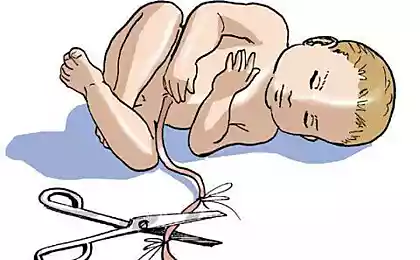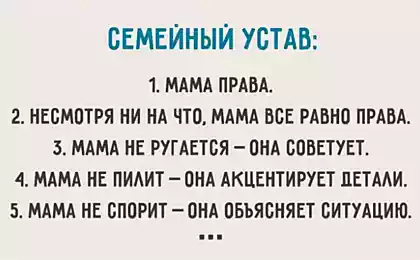548
He taught me Chinese nanny
Two months ago, was born my second son and I was amazed at how childbirth was easier and more comfortable, and the two months after is calmer and quieter (in terms of crying).
In many respects this increased level of happiness I owe special Chinese nanny that we hired to help for the first three months of baby's life.
For the Chinese population assistant newly the mother is an essential figure in the first month of motherhood. This period is called confinement, which can be translated as "restrictions" and the special nurses at this time confinement nanny.

What is a restrictive practice (confinement)?
Restrictive practices are traditional postnatal practices that can help new mother to recover from the different effects of pregnancy and childbirth. Traditionally, the mother and child are literally in conclusion: complied with the strict home quarantine. Such practices with certain nuances used by the Chinese, Malays and Indians. Combines the practices of different communities desire to support the new mother and help her to correct her physical and emotional strength.
In modern conditions of life some mothers do not use a restrictive practice at all, considering them old-fashioned, but many still observe their part to rest and recover after childbirth.
Take for example some of the rules of these practices:
— the prohibition to wash your hair during the restriction period;
— protection from "cooling" elements such as cold water, from the impact of air conditioning or fan;
swim only in specially prepared warm water, which insisted on the herbs;
— use the services of traditional masseurs, massaging the abdomen and connecting it with a special postnatal corset.
Traditionally, the period of limitations on the new mom takes care of her mother or mother-in-law. In Singapore, where we live now, the local Chinese women hire special nurses.
After listening to their feedback, I did the same thing and not only agreed to standard help with the baby, but decided to try the traditional rules of power than unexpectedly pleased by his nanny (not a lot of acitance agree). She promised that a special diet will be able to establish milk production, to overcome the problems with the tummy of the child, and to make me relaxed, satisfied and happy.
Despite my skepticism about her promises, she managed to complete them 100%. Because its manipulation has provided us with little positive impact, I decided to share those recommendations that can be used alone without a deep knowledge of Chinese traditions.
Dietary secrets of the confinement nanny
The restriction period mothers are advised to follow a special diet. This diet is based on traditional Chinese medicine and the theory that all the products can generate in the body or "hot" energy (relates to the Chinese concept of Yang) or "cold" energy (corresponds to the concept of Yin).
The idea is to separate the products on improve and reduce the heat associated with the understanding of the need for balance between Yin and Yang. Traditionally, residents of Asia, especially China, it is the imbalance of these elements explains some of the emotional (irritability, temper, fatigue, or lethargy) and physical condition (fever, sore throat and runny nose, ulcers in the mouth, indigestion or constipation, tides blood to a person or cheeks, rashes, acne, dark yellow urine).
It is believed that hot foods like hot sun, are sweet or spicy, "dry" or "hard", high in fats and sodium. A "cooling" products grow with a small amount of sunlight, they are non-greasy, "wet" and "soft", rich in potassium.
Some "cooling" foods: bananas, pears, grapefruits, persimmons, watermelon, tangerine, strawberry, pineapple, tomatoes, Chinese bitter gourd, lettuce, cucumbers, broccoli and cauliflower, zucchini, radish, Lotus root, seaweed; turmeric, marjoram, mint, sugarcane, barley, bean curd, chicken egg white, yogurt, clams and crabs.
Neutral foods: apricots, papaya, apples, figs, dates, plums, raspberries, raisins, beets, carrots, celery, olives, potatoes, pumpkin, sweet potato, radish leaf, cauliflower, Brussels sprouts, peas in pods, rice, red beans, yellow soya beans, sunflower seeds, mushrooms, honey, sage, rosemary, thyme, milk, chicken egg yolk, beef, pork, carp, cuttlefish, duck.
Some "warming" foods: cherries, raspberries, blackberries, black currants, mangos, grapes, chestnuts, grapefruit, peaches, garlic, leeks, shallots, green onion, soybean oil, vinegar, walnuts, apricot seeds, pepper (seasoning), cinnamon, ginger, brown sugar, coffee, nutmeg, Basil, cloves, coriander, chicken, ham, lamb, shrimp.
Importantly, as the food is cooked. For example, beef is considered "neutral" product, but if you cook it on the grill or fry much, it becomes a "warming" dish.
Postpartum should eat dishes that "increase the heat" in the body. It is believed that it improves blood circulation, strengthens the joints, stimulates the production of breast milk is struggling with "wind" — that is, gases — both the mother and the child, prevents hair loss and premature aging. But "cooling" foods should be avoided: they can cause the opposite effect, and cause rheumatism, arthritis and weakening of joints in the mother.
Of course, I have not followed the diet 100% — primarily because it involves daily consumption of meat, especially pork. Of all the many recommendations, I learned a few basic rules that will definitely stick to next time (if it happens).
What rules I followed:
1. The first month did not drink water (at all), just very warm fruit drinks and infusions. During the first two weeks every day, drank a decoction of red beans red adzuki beans cooked until tender, the broth is consumed. The beans can also be eaten.
Stewed fruit: red dates, black dates, prunes, Goji berries, dried tangerine peel, dried longan (everything is available in Russia). Dried longan, by the way, promotes relaxation and good sleep, which in turn helps milk production.
2. Eat fresh oily fish almost every day. It is believed that fresh fish promotes healing of internal organs and tissues.
3. Avoided the "cooling" elementscontained, for example, in cucumber, young coconut, spinach, watermelon and other foods with "cooling" list (see above).
4. Ate a LOT of ginger. Every morning the nurse was rubbing two ginger root on a fine grater. This grated ginger added to any dish: vegetables stir‑fry, baked fish, soups. To comply with the standard monthly confinement‑program is bought about 4-5 pounds of ginger! It is not only useful for digestion but also very effectively "warms" the body, which again contributes to the production of milk.
5. Every day I drank ginger tea — the juice of grated ginger, filled with hot water, plus a teaspoon of honey if desired. In the first week — no more than one Cup of this tea a day starting from the second week — two cups or more.
Ginger prevents gas formation and the emergence of other problems with the tummy. My first son cried every day for several months, especially at night because his tummy hurt. The second son didn't cry about it, and never sleeps a lot better. I attribute it to the presence of large number of ginger in his "diet" .
6. Ate many and varied: always green leafy vegetables (only prepared), root vegetables, wild rice, mushrooms, nuts (every day different), fruits, including pomelo (only recommended a citrus fruit), and of course the soup of papaya and fish bones (you can just fish, but somehow used the bone).
This soup is a must to stimulate milk production. It is believed that the papaya is combined with fish oil has a profound effect.
7. Other ways supported the "internal" heat — went to warm shoes and warm clothes, sat under the air conditioning, took a hot shower.
Of course, when my nanny came to us with a huge bag of roots, herbs, berries, and other suspicious ingredients and began to prepare some potions, I was a bit skeptical that they are ready to eat it all.
In order to dispel the concerns for their health and the health of the baby I immediately called the doctor. The doctor is not quite politically correct answer, I'm afraid I shouldn't, all these dried roots and tops will not bring harm. However, use may no not be, because "the fact that the Chinese well, you Europeans are usually useless."
I don't know, ginger or autosuggestion, but this time my baby and I objectively feel a lot better, what we wish all the moms and kids! published
Author: Yulia Korneva
P. S. And remember, only by changing their consumption — together we change the world! ©
Join us in Facebook , Vkontakte, Odnoklassniki
Source: live-up.co/chemu-menya-nauchila-kitajskaya-nyanya-or-chem-polezen-imbir-novoispechennoj-mame/
In many respects this increased level of happiness I owe special Chinese nanny that we hired to help for the first three months of baby's life.
For the Chinese population assistant newly the mother is an essential figure in the first month of motherhood. This period is called confinement, which can be translated as "restrictions" and the special nurses at this time confinement nanny.

What is a restrictive practice (confinement)?
Restrictive practices are traditional postnatal practices that can help new mother to recover from the different effects of pregnancy and childbirth. Traditionally, the mother and child are literally in conclusion: complied with the strict home quarantine. Such practices with certain nuances used by the Chinese, Malays and Indians. Combines the practices of different communities desire to support the new mother and help her to correct her physical and emotional strength.
In modern conditions of life some mothers do not use a restrictive practice at all, considering them old-fashioned, but many still observe their part to rest and recover after childbirth.
Take for example some of the rules of these practices:
— the prohibition to wash your hair during the restriction period;
— protection from "cooling" elements such as cold water, from the impact of air conditioning or fan;
swim only in specially prepared warm water, which insisted on the herbs;
— use the services of traditional masseurs, massaging the abdomen and connecting it with a special postnatal corset.
Traditionally, the period of limitations on the new mom takes care of her mother or mother-in-law. In Singapore, where we live now, the local Chinese women hire special nurses.
After listening to their feedback, I did the same thing and not only agreed to standard help with the baby, but decided to try the traditional rules of power than unexpectedly pleased by his nanny (not a lot of acitance agree). She promised that a special diet will be able to establish milk production, to overcome the problems with the tummy of the child, and to make me relaxed, satisfied and happy.
Despite my skepticism about her promises, she managed to complete them 100%. Because its manipulation has provided us with little positive impact, I decided to share those recommendations that can be used alone without a deep knowledge of Chinese traditions.
Dietary secrets of the confinement nanny
The restriction period mothers are advised to follow a special diet. This diet is based on traditional Chinese medicine and the theory that all the products can generate in the body or "hot" energy (relates to the Chinese concept of Yang) or "cold" energy (corresponds to the concept of Yin).
The idea is to separate the products on improve and reduce the heat associated with the understanding of the need for balance between Yin and Yang. Traditionally, residents of Asia, especially China, it is the imbalance of these elements explains some of the emotional (irritability, temper, fatigue, or lethargy) and physical condition (fever, sore throat and runny nose, ulcers in the mouth, indigestion or constipation, tides blood to a person or cheeks, rashes, acne, dark yellow urine).
It is believed that hot foods like hot sun, are sweet or spicy, "dry" or "hard", high in fats and sodium. A "cooling" products grow with a small amount of sunlight, they are non-greasy, "wet" and "soft", rich in potassium.
Some "cooling" foods: bananas, pears, grapefruits, persimmons, watermelon, tangerine, strawberry, pineapple, tomatoes, Chinese bitter gourd, lettuce, cucumbers, broccoli and cauliflower, zucchini, radish, Lotus root, seaweed; turmeric, marjoram, mint, sugarcane, barley, bean curd, chicken egg white, yogurt, clams and crabs.
Neutral foods: apricots, papaya, apples, figs, dates, plums, raspberries, raisins, beets, carrots, celery, olives, potatoes, pumpkin, sweet potato, radish leaf, cauliflower, Brussels sprouts, peas in pods, rice, red beans, yellow soya beans, sunflower seeds, mushrooms, honey, sage, rosemary, thyme, milk, chicken egg yolk, beef, pork, carp, cuttlefish, duck.
Some "warming" foods: cherries, raspberries, blackberries, black currants, mangos, grapes, chestnuts, grapefruit, peaches, garlic, leeks, shallots, green onion, soybean oil, vinegar, walnuts, apricot seeds, pepper (seasoning), cinnamon, ginger, brown sugar, coffee, nutmeg, Basil, cloves, coriander, chicken, ham, lamb, shrimp.
Importantly, as the food is cooked. For example, beef is considered "neutral" product, but if you cook it on the grill or fry much, it becomes a "warming" dish.
Postpartum should eat dishes that "increase the heat" in the body. It is believed that it improves blood circulation, strengthens the joints, stimulates the production of breast milk is struggling with "wind" — that is, gases — both the mother and the child, prevents hair loss and premature aging. But "cooling" foods should be avoided: they can cause the opposite effect, and cause rheumatism, arthritis and weakening of joints in the mother.
Of course, I have not followed the diet 100% — primarily because it involves daily consumption of meat, especially pork. Of all the many recommendations, I learned a few basic rules that will definitely stick to next time (if it happens).
What rules I followed:
1. The first month did not drink water (at all), just very warm fruit drinks and infusions. During the first two weeks every day, drank a decoction of red beans red adzuki beans cooked until tender, the broth is consumed. The beans can also be eaten.
Stewed fruit: red dates, black dates, prunes, Goji berries, dried tangerine peel, dried longan (everything is available in Russia). Dried longan, by the way, promotes relaxation and good sleep, which in turn helps milk production.
2. Eat fresh oily fish almost every day. It is believed that fresh fish promotes healing of internal organs and tissues.
3. Avoided the "cooling" elementscontained, for example, in cucumber, young coconut, spinach, watermelon and other foods with "cooling" list (see above).
4. Ate a LOT of ginger. Every morning the nurse was rubbing two ginger root on a fine grater. This grated ginger added to any dish: vegetables stir‑fry, baked fish, soups. To comply with the standard monthly confinement‑program is bought about 4-5 pounds of ginger! It is not only useful for digestion but also very effectively "warms" the body, which again contributes to the production of milk.
5. Every day I drank ginger tea — the juice of grated ginger, filled with hot water, plus a teaspoon of honey if desired. In the first week — no more than one Cup of this tea a day starting from the second week — two cups or more.
Ginger prevents gas formation and the emergence of other problems with the tummy. My first son cried every day for several months, especially at night because his tummy hurt. The second son didn't cry about it, and never sleeps a lot better. I attribute it to the presence of large number of ginger in his "diet" .
6. Ate many and varied: always green leafy vegetables (only prepared), root vegetables, wild rice, mushrooms, nuts (every day different), fruits, including pomelo (only recommended a citrus fruit), and of course the soup of papaya and fish bones (you can just fish, but somehow used the bone).
This soup is a must to stimulate milk production. It is believed that the papaya is combined with fish oil has a profound effect.
7. Other ways supported the "internal" heat — went to warm shoes and warm clothes, sat under the air conditioning, took a hot shower.
Of course, when my nanny came to us with a huge bag of roots, herbs, berries, and other suspicious ingredients and began to prepare some potions, I was a bit skeptical that they are ready to eat it all.
In order to dispel the concerns for their health and the health of the baby I immediately called the doctor. The doctor is not quite politically correct answer, I'm afraid I shouldn't, all these dried roots and tops will not bring harm. However, use may no not be, because "the fact that the Chinese well, you Europeans are usually useless."
I don't know, ginger or autosuggestion, but this time my baby and I objectively feel a lot better, what we wish all the moms and kids! published
Author: Yulia Korneva
P. S. And remember, only by changing their consumption — together we change the world! ©
Join us in Facebook , Vkontakte, Odnoklassniki
Source: live-up.co/chemu-menya-nauchila-kitajskaya-nyanya-or-chem-polezen-imbir-novoispechennoj-mame/
Warm fish salad in Asian style
What not to eat in the morning on an empty stomach and before bedtime























